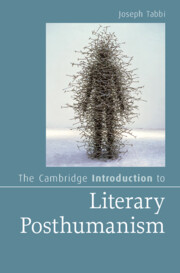Book contents
- The Cambridge Introduction to Literary Posthumanism
- The Cambridge Introduction to Literary Posthumanism
- Copyright page
- Contents
- Illustrations
- Acknowledgments
- Introduction
- Chapter 1 Beyond the Two Cultures?
- Chapter 2 Mary Shelley’s Modern and Shelley Jackson’s Postmodern Prometheus
- Chapter 3 Postperiodization
- Chapter 4 Posthuman Sublime
- Chapter 5 Ah Bartleby, Ah Humanities!
- Chapter 6 The Posthuman Imagination in Contemporary Literature
- Chapter 7 Posthuman Epic in the Era of AI
- Chapter 8 Interlude
- Chapter 9 Digital Posthumanism (On the Periphery)
- Epilogue:
- A Collaborative Glossary of Terms (In Process)
- Works Cited
- Index
- Cambridge Introductions to Literature
- References
A Collaborative Glossary of Terms (In Process)
Published online by Cambridge University Press: 04 December 2024
- The Cambridge Introduction to Literary Posthumanism
- The Cambridge Introduction to Literary Posthumanism
- Copyright page
- Contents
- Illustrations
- Acknowledgments
- Introduction
- Chapter 1 Beyond the Two Cultures?
- Chapter 2 Mary Shelley’s Modern and Shelley Jackson’s Postmodern Prometheus
- Chapter 3 Postperiodization
- Chapter 4 Posthuman Sublime
- Chapter 5 Ah Bartleby, Ah Humanities!
- Chapter 6 The Posthuman Imagination in Contemporary Literature
- Chapter 7 Posthuman Epic in the Era of AI
- Chapter 8 Interlude
- Chapter 9 Digital Posthumanism (On the Periphery)
- Epilogue:
- A Collaborative Glossary of Terms (In Process)
- Works Cited
- Index
- Cambridge Introductions to Literature
- References
Summary
Glossaries, encyclopedias, maps, topical histories, and dictionaries: these were a formative presence at the start of the humanities, and together they enabled humanists to see how their own conceptual interests and vocabularies contributed to a long-term disciplinary project. With that deep history in mind, those of us wishing to establish a different, posthumanities praxis should not neglect the originating influence of precursors on the order of Samuel Johnson and M. H. Abrams, whose scholarly acumen imparted a new life to previously scripted disciplines.
- Type
- Chapter
- Information
- The Cambridge Introduction to Literary Posthumanism , pp. 162 - 197Publisher: Cambridge University PressPrint publication year: 2024

